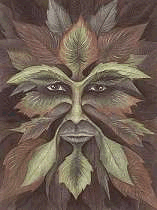 |
The
green man |
Neopaganism (‘new Paganism’) is a term that refers to a mixed group of modern religions that draw upon a heritage coming down through the ages from ancient—mainly European—pre-Christian religions.* Although Neopagan practices are extremely diverse, core beliefs include a multiplicity of deities of all genders, a perception of deity as both immanent and transcendent, a commitment to environmental awareness, and a willingness to perform magic as well as spiritual rituals for the betterment of all.
Almost all modern Pagans celebrate a cycle of eight festivals, which are spaced every six or seven weeks and divide the ‘wheel of the year’ into eight segments. The festival of Mabon occurs at the time of the autumnal equinox. As the moment just before the night begins its ascendancy over day, it is an appropriate time to thank the sun for the gift of the harvest and to welcome the impending dark.
The autumnal equinox was not celebrated in Celtic countries, however September was known as haleg-monath (‘holy month’) in Anglo Saxon. In Celtic mythology, Mabon was a young god who was abducted and imprisoned only to return at a later date; it is for this reason that in some Pagan circles his name was adopted for this festival.
Modern Druids observe the equinox as Mea’n Fo’mhair, using it as an opportunity to honour the Green Man—the god of the forest—by offering libations to trees. For Wiccans the equinox is a time to celebrate the aging Goddess as she passes from Mother to Crone, and her consort the God as he prepares for death and re-birth. And yet another name for the festival of Mabon is Harvest Home, an appropriate time for rituals of thanksgiving for the fruits of the earth and a recognition of the need to share them to secure the blessings of the Goddess and God during the coming winter months.